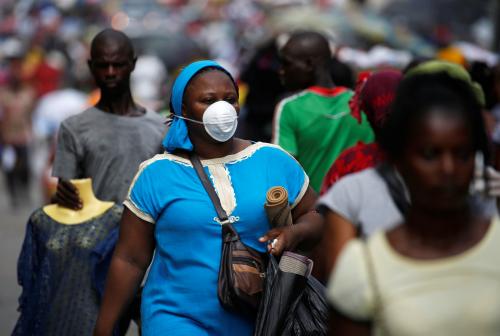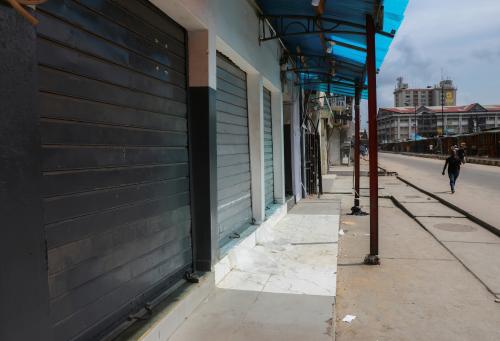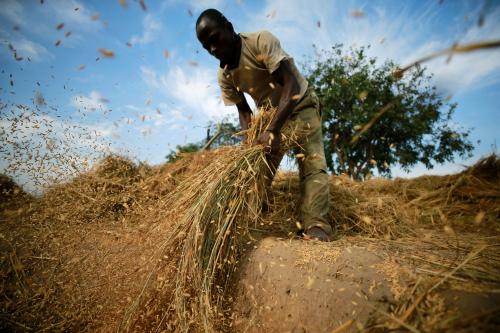Sub-Saharan Africa economic growth update
This week, the World Bank announced that economic activity in sub-Saharan Africa is on course to contract by 2.8 percent in 2020, largely due to the COVID-19 pandemic. According to the World Bank, this contraction will be the most severe on record, with the region’s two biggest economies—Nigeria and South Africa—predicted to contract by 3.2 and 7.1 percent, respectively, this year. Indeed, Reuters reports that South Africa’s manufacturing output fell 5.4 percent year-on-year in March. Overall, economies across the region have been hit hard, with Zambia predicting it will fall short of projected revenue by 20 percent, necessitating a sweeping budget revision. Though the report also predicts a rebound of growth to a positive 3.1 percent in 2021, it also says that fluctuating commodity prices, looming food crises, and the pandemic—which may trigger cascading consequences for health more broadly and social unrest—all cloud the projected recovery with uncertainty.
Also this week, the International Monetary Fund announced that Kenya has overtaken Angola as the third-largest economy in sub-Saharan Africa. Angola’s economy has contracted every year since 2016, largely due to a steady drop in oil output, on which its economy sorely relies. Kenya’s economy is not without challenges, though, as its National Assembly shared its budget this week, in which it revealed that one-third of spending will go toward servicing the country’s rising debt.
Nigeria budget, economy, and security updates
Earlier this week, Nigeria’s federal government released a revised budget proposal for 2020 that cuts health care spending by 40 percent. The proposed cuts come after weak international markets for oil and retail resulted in lower revenue that could not support the record-high budget for 2020. Critics of the cuts to health care argue that other areas, such as renovating Nigeria’s National Assembly buildings, received inappropriately small reductions in funding despite the immense strain the coronavirus pandemic is putting on the country’s health care system. Nigeria has had 14,554 confirmed cases of COVID-19 as well as 387 deaths from the virus as of this writing.
Nigeria, which relies on exports for a significant share of government revenue, recorded its second straight quarter with a negative trade deficit after posting 12 straight quarters with a positive balance, according to a report released by its National Bureau of Statistics. While overall trade posted a year-over-year gain of 0.8 percent, total export value decreased by nearly 10 percent compared to Q1 of 2019. Crude oil, which constituted 72 percent of export value in Q1 of 2020, was primarily responsible for the fall, as exports of the commodity were 12.8 percent lower than in Q1 of 2019.
Violence continued in northwest Nigeria Wednesday as approximately 150 gunmen on motorcycles, who are believed to be part of Boko Haram, killed 57 people in six villages, looting shops and stealing more than 200 cattle. The unrest, driven in part by the climate-induced scarcity of land and resources in the region, has seen roughly 8,000 people killed and 200,000 people displaced since 2011.
Nigerian President Muhammadu Buhari nominated former finance minister and AGI Distinguished Advisory Board member Ngozi Okonjo-Iweala to be the country’s candidate to succeed World Trade Organization (WTO) Director-General Roberto Azevedo, who intends to step down at the end of August. Buhari had previously backed Yonov Frederik Agah, Nigeria’s permanent representative to the WTO, but has withdrawn his candidacy for the position.
Burundi’s President Nkurunziza passes away, ending 15 years in power
On June 9, the Burundian government announced that President Pierre Nkurunziza, outgoing leader of Burundi, died at the age of 55 of cardiac arrest. After feeling ill on Saturday and being admitted to a hospital in the town of Karuzi, his condition appeared to improve on Sunday before it abruptly deteriorated on Monday. The government has declared a week of mourning.
The sudden death of Nkurunziza concludes a 15-year rule marked by allegations of human rights violations and political repression by the international community. Initially elected to the presidency in 2005 after the Burundian Civil War, he was reelected in 2010. Ahead of the 2015 elections, the country’s Constitutional Court declared Nkurunziza eligible for a third term, asserting that his first term did not count toward the two-term constitutional limit because he had been elected to the position by the parliament rather than a nationwide vote. This decision spurred protests met with violence, and over 100,000 fled amid the unrest. During Nkurunziza’s final term, in 2017, Burundi became the first country to withdraw from the International Criminal Court after the court announced investigations against the country for state-sponsored crimes against humanity. The country also forced the closure of the local human rights office of the United Nations in 2019.
Nkurunziza’s death comes at a time of transition for the country: On May 25, retired general Evariste Ndayishimiye was declared the winner of the presidential election that was marred by criticisms of fraud and irregularities. Ndayishimiye is a member of Nkurunziza’s ruling party, the CNDD-FDD, and many expected Nkurunziza to maintain an influential role in the government behind the scenes.
In other political news, Ethiopia approved extended terms for the prime minister and lawmakers after the elections originally scheduled for August were postponed due to COVID-19. The new election date has yet to be set. On June 5, the constitutional court of the Central African Republic declared that it will not extend its presidential mandate and must hold a general election by December 27, and Malawi announced a new presidential election date of June 23.








Commentary
Africa in the news: African economic growth, Nigeria, and Burundi updates
June 13, 2020